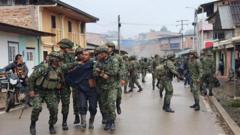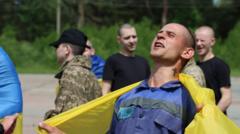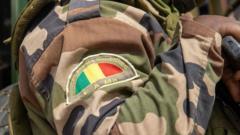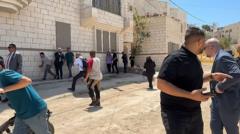The Colombian government has confirmed that 15 police officers and 12 soldiers have tragically lost their lives in targeted incidents over the past two weeks, primarily attributed to armed factions. President Gustavo Petro has denounced the Gulf Clan criminal organization and other militant groups for these assaults, which are seen as acts of vengeance for the recent deaths of their leaders. The determination to halt these violent retaliations has led the government to announce a reward for information leading to the arrest of those responsible for the heinous attacks.
Targeted Attacks Against Colombian Security Forces Result in 27 Fatalities
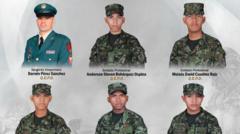
Targeted Attacks Against Colombian Security Forces Result in 27 Fatalities
In a span of just two weeks, focused assaults on Colombian police and military personnel have left a staggering 27 dead, as reported by government officials.
In pursuit of a "total peace" agenda, Petro's administration faces significant setbacks; the interior minister openly admitted that the peace process is faltering, especially following the collapse of negotiations with the Gulf Clan and other insurgent factions. On social media, Petro released the names of the fallen officers and soldiers, labeling the attacks as coordinated efforts against law enforcement.
Among the victims, a notably deadly ambush occurred in Guaviare province, resulting in the deaths of seven soldiers, attributed to a splinter group of the Revolutionary Armed Forces of Colombia (FARC). This faction, rejecting the peace accord signed with the government in 2016, continues to pose a threat to security forces across the nation. While Petro’s government attempted negotiations with dissident factions and the National Liberation Army (ELN), talks with ELN were halted due to perceived uncommitment to peace.
Previous attempts at maintaining ceasefires and peace dialogues have repeatedly faltered, especially after a police operation targeting Gulf Clan leader "Chiquito Malo" in February, which incited retaliation against law enforcement by the Gulf Clan. The violence represents a severe challenge to the stability that Colombia has sought since the historic peace agreement years ago.
As tensions escalate, the fight for security and peace in Colombia remains an arduous journey, with both the government and law enforcement under increasing strain.
Among the victims, a notably deadly ambush occurred in Guaviare province, resulting in the deaths of seven soldiers, attributed to a splinter group of the Revolutionary Armed Forces of Colombia (FARC). This faction, rejecting the peace accord signed with the government in 2016, continues to pose a threat to security forces across the nation. While Petro’s government attempted negotiations with dissident factions and the National Liberation Army (ELN), talks with ELN were halted due to perceived uncommitment to peace.
Previous attempts at maintaining ceasefires and peace dialogues have repeatedly faltered, especially after a police operation targeting Gulf Clan leader "Chiquito Malo" in February, which incited retaliation against law enforcement by the Gulf Clan. The violence represents a severe challenge to the stability that Colombia has sought since the historic peace agreement years ago.
As tensions escalate, the fight for security and peace in Colombia remains an arduous journey, with both the government and law enforcement under increasing strain.


